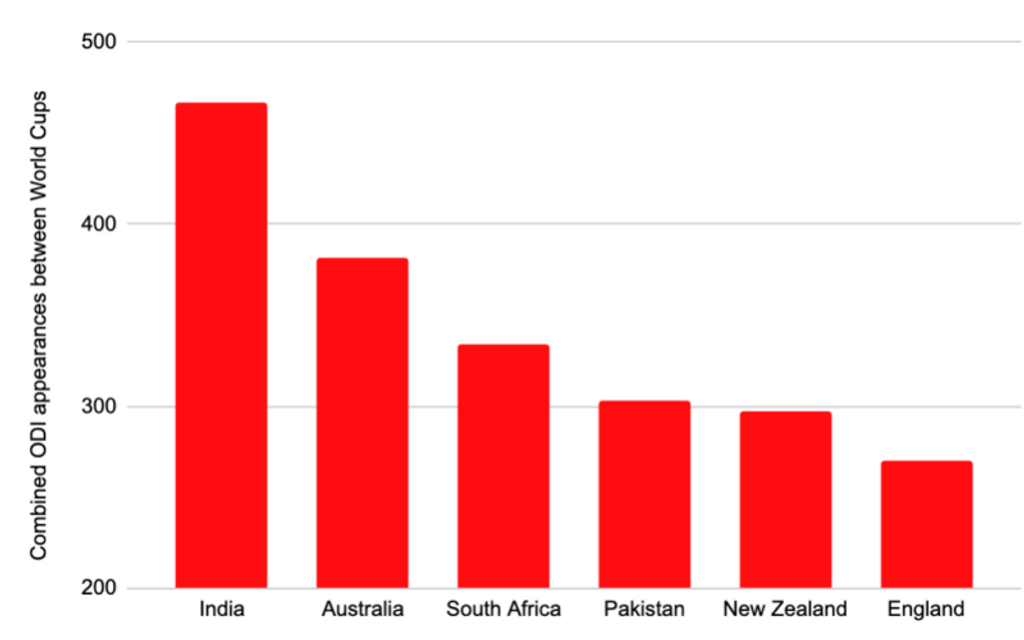
the reigning world champions’ early defeats to New Zealand, Afghanistan and South Africa leave them on the brink of a painfully early exit.
To bet on the World Cup with our Match Centre Partners bet365 head here.
Both head coach Matthew Mott and 2019 World Cup winner Joe Root have identified England’s light build-up to the World Cup as a factor in their lacklustre start. “It would have been nice to [have] a six-month period where you slowly work things through as a group,” said Root after the defeat to South Africa.
ODI cricket was very much on the backburner for much of the six months leading up to the World Cup as a thrilling home Ashes series took centre stage. In fact, from their tour to Bangladesh in March to their four-match ODI series against New Zealand in September, England didn’t play a single ODI. Clearly not ideal preparation for a global event, but how does it compare to England’s main competitors at the World Cup?
Comparing the six teams expected to challenge for semi-final spots at the start of the tournament (India, Australia, South Africa, New Zealand, Pakistan and England), five of them competed in a broadly similar number of matches in the four-year cycle leading up to the 2023 World Cup. India lead with 66 games but the other five all played between 36 and 44 matches; England’s 42 games actually compares reasonably favourably against the majority of their rivals.
As new franchise leagues have spawned in the four years between World Cups, India have a competitive advantage when it comes to finding time in the schedule for more bilateral ODI cricket. Indian players are not allowed to play in non-IPL T20 tournaments which in theory gives them better availability throughout the year. Whereas Rohit Sharma only plays for India and the Mumbai Indians, Jos Buttler has represented England, Lancashire, Manchester Originals, Rajasthan Royals and the Paarl Royals in the last year. Also, as Root himself noted after the South Africa defeat, England are also the busiest Test team in the world. In the four years between World Cups, England played 17 Tests more than India and Australia, 25 more than New Zealand, 26 more than Pakistan, and 28 more than South Africa.
The real difference between England and their competitors is the number of games the players they took to the World Cup had under their belt. Of England’s five ODI series leading up to the World Cup, they were only full-strength in one – the four-match series against New Zealand in September – leaving several players desperately short on ODI cricket leading up to the World Cup. Jonny Bairstow, Joe Root, Ben Stokes, Mark Wood, Chris Woakes, Harry Brook all played in 10 or fewer ODIs in the two years running up to the tournament.
Of the top six teams in the ODI world rankings, England’s players had the fewest ODI appearances between them in the 2019-2023 World Cup cycle.

Put bluntly, they were undercooked heading into the World Cup. A side who historically enjoyed chasing entered the World Cup with just one successful chase against a Full Member in the two years leading up to the tournament. Although the wider complexities around the increasingly compact calendar made creating a wholistic schedule that considers the needs of all three formats difficult, the decision-makers (and players) are not entirely blameless. For one, it’s less than a year since Root chose to play in the ILT20 over an ODI series against South Africa, remarking, “I have a lot of experience in playing 50-over cricket now. I have got a good understanding of how to play in ODIs. I really want to develop my white-ball game further and if there is anything that I can add to my 50-over game, it will come from playing more T20 cricket.”
The hope will be that one of the benefits of this World Cup’s format is that early poor form isn’t terminal. Australia, for example, opened their account with back-to-back defeats but now look decently placed to mount a charge for the semi-finals. In theory, there is enough time to turn around a bad start. In practice though, that time is fast running out.








